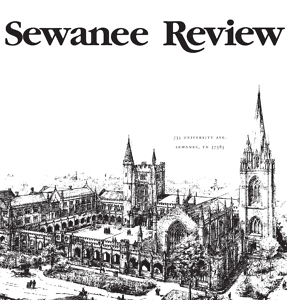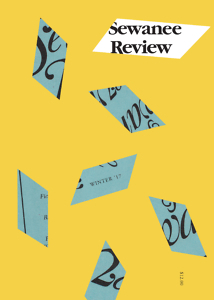The Sewanee Review has been around since 1892 and claims the title of “the longest-running literary quarterly in America.” Great writers from T.S. Eliot to Hannah Arendt have been published in its pages, and the journal long ago achieved venerable status—which is, of course, a mixed blessing. Reverence for tradition and creative lineage is not necessarily a bad thing in a literary magazine, but it can become a major hurdle to keeping a publication fresh and relevant. When acclaimed writer Adam Ross (author of Mr. Peanut and Ladies and Gentlemen) was named the successor to George Core, who had held the job for more than four decades, it was a clear signal that the Review would be entering an era of renewal, as well as continued excellence.
 The winter 2017 issue is Ross’s editorial debut, and he has put together an impressive and eclectic mix of work that draws from both established writers and highly regarded newcomers. There is fiction from Michael Knight and Jamie Quatro, and poetry from Christian Wiman and A.E. Stallings. John Jeremiah Sullivan contributes an essay, as does Lauren Groff. Among the newer voices are Stephanie Danler, whose first novel, Sweetbitter, got lavish attention last year, and Tiana Clark, a Vanderbilt M.F.A. candidate whose work has already garnered a number of prizes. Two fiction writers, Sidik Fofana and John Sesgo, are seeing their first published stories here.
The winter 2017 issue is Ross’s editorial debut, and he has put together an impressive and eclectic mix of work that draws from both established writers and highly regarded newcomers. There is fiction from Michael Knight and Jamie Quatro, and poetry from Christian Wiman and A.E. Stallings. John Jeremiah Sullivan contributes an essay, as does Lauren Groff. Among the newer voices are Stephanie Danler, whose first novel, Sweetbitter, got lavish attention last year, and Tiana Clark, a Vanderbilt M.F.A. candidate whose work has already garnered a number of prizes. Two fiction writers, Sidik Fofana and John Sesgo, are seeing their first published stories here.
Ross is on the record as seeking fresh and more diverse voices for TSR, and these debut stories make good on the claim. Fofana’s “The Okiedoke” is a kinetic account of a young man named Swan who welcomes a friend home from prison. Set in Harlem, the story is told entirely in an urban black vernacular that could easily go over the top but never seems to. Swan’s voice is real and tender, and has a kind of effortless lyricism: “Mayella had the Welcome Home sign over the radiator. Wine coolers iced up in the trash can. I come in and see my nigga all tatted up and brolic, veins up and down his neck. I’m like, Yo. that’s my nigga. Made good use of the time.”
“From La Ribera,” John Sesgo’s story of a young man’s sexual longing, takes place on Spain’s southeastern coast, and it is as quiet and slow-moving as “The Okiedoke” is tense and energetic. Both stories are beautifully crafted and hold up well alongside the masterful pieces from Knight and Quatro.
The bar is set equally high in nonfiction. “Engrams, California,” Stephanie Danler’s unsparing bit of memoir about returning to the site of childhood sorrow, is as edgy and harsh as its Imperial Valley setting, and it has as much emotional heft as any of the fiction here. Sullivan’s “The Curses, Pt. I” is a characteristically elegant riff on the origin of the blues—not so much the genre as the term itself, which was apparently coined by an African American cakewalker-turned-critic named Columbus Bragg.
Jon Meacham actually has two pieces in the issue: “Hillary and the Grand Inquisitor” considers the meaning of Clinton’s love of Dostoevsky, while “Trump’s Literacy” muses on the problem of a president who may possess no personality “beyond a consuming Nietzschean belief in his own centrality.” The Clinton essay was commissioned the summer before the election, in full confidence that she would win; Meacham wrote his thoughts on Trump in the immediate aftermath of her loss. The two pieces run side by side on the page, offering an unsettling contrast between what is and what might have been.
 There are fourteen poems from seven poets here, including work from Katy Didden, Michael Shewmaker, Jennifer Habel, and Edgar Kunz, in addition to Stallings and Clark. Christian Wiman contributes a single poem—a stunning three-stanza gem called “Good Lord the Light”—which serves as an introduction to a lengthy appreciation of his work by Adam Kirsch. There’s a more personal critical piece on Mark Strand by Mary Jo Salter, remarkable for its intimacy and insight into the late poet’s way of thinking and being in the world.
There are fourteen poems from seven poets here, including work from Katy Didden, Michael Shewmaker, Jennifer Habel, and Edgar Kunz, in addition to Stallings and Clark. Christian Wiman contributes a single poem—a stunning three-stanza gem called “Good Lord the Light”—which serves as an introduction to a lengthy appreciation of his work by Adam Kirsch. There’s a more personal critical piece on Mark Strand by Mary Jo Salter, remarkable for its intimacy and insight into the late poet’s way of thinking and being in the world.
A mostly lighthearted interview with Jill McCorkle fills a good chunk of the issue, offering up an interesting discussion of her writing process and a substantial dose of her charm. And finally, Ross delivers his own “State of Letters,” the Review’s traditional address to the readership by each new editor. In it, Ross affirms Nabokov’s notion of the writer as an enchanter, but goes further to say that art can “recalibrate how we see the world and ourselves.” The best work, he writes, “leads the reader closer to something like enlightenment—a clear-sightedness that apprehends things for what they are.” It’s a lofty ideal, to be sure, but one Ross is clearly pursuing in this outstanding new iteration of a grand old journal.

Maria Browning is a fifth-generation Tennessean who grew up in Erin and Nashville. A graduate of Mount Holyoke College, she has attended the Clothesline School of Writing in Chicago, the Moss Workshop with Richard Bausch at the University of Memphis, and the Sewanee Writers’ Conference. She lives in White Bluff.
Tagged: Poetry





